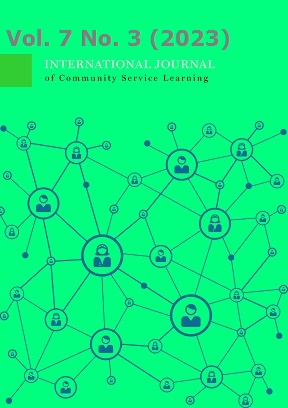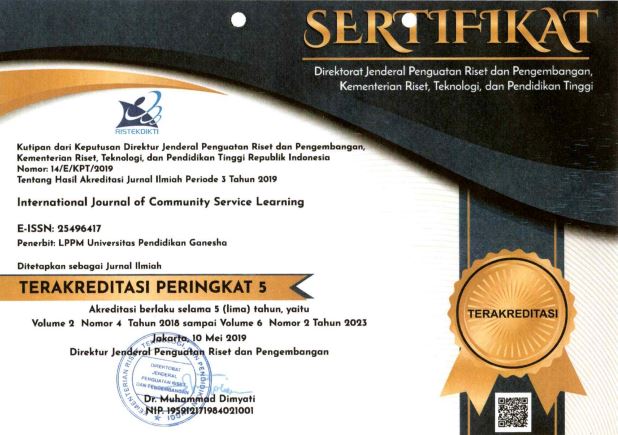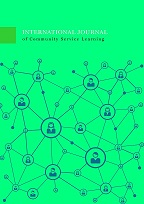Numeracy Skills Assistance for Undocumented Children
DOI:
https://doi.org/10.23887/ijcsl.v7i3.66811Keywords:
Numeracy skills, Undocumented Children, MathematicsAbstract
Numeracy is the ability to understand and use numbers and mathematical concepts in everyday life. Santri in An Nahdhoh may have problems with their numeracy skills due to various factors, including limited access to quality educational resources, traditional teaching methods that may not effectively foster understanding of mathematics, potential curriculum priorities that prioritize religious education over mathematics, language barriers, and a lack of tailored support for individual skills gaps. Students' willingness to learn numeracy skills can also be influenced by socio-economic limitations and cultural attitudes in the Santri community. Therefore, this service research aims to provide comprehensive guidance, especially to An-Nahdhah, which in the end can improve numeracy results among students. This initiative involves the participation of 25 students. This research is quantitative in nature with data analysis techniques using the t-test. Community service is important and relevant in several ways, including increasing numeracy literacy, application of religion, daily living skills, developing analytical skills, preparation for further education, increasing competitiveness, and introducing technology. This community service includes the following stages: preparation, assessment, implementation and evaluation. An-Nahdlah's numeracy support program for undocumented children offers several great benefits, particularly in helping
References
Abidin, Z. (2020). Educational Management of Pesantren in Digital Era 4.0. Jurnal Pendidikan Agama Islam, 17(2), 203–216. https://doi.org/10.14421/JPAI.2020.172-07. DOI: https://doi.org/10.14421/jpai.2020.172-07
Allerton, C. (2020). Invisible children? Non-recognition, humanitarian blindness and other forms of ignorance in Sabah, Malaysia. Critique of Anthropology, 40(4), 455–470. https://doi.org/10.1177/0308275X20959435. DOI: https://doi.org/10.1177/0308275X20959435
Arifin, M. Z. (2022). The Traditionalism of the Islamic Boarding School Education System in the Era of Modernization. Scaffolding: Jurnal Pendidikan Islam Dan Multikulturalisme, 4(1), 286–396. https://doi.org/10.37680/SCAFFOLDING.V4I1.1367. DOI: https://doi.org/10.37680/scaffolding.v4i1.1367
As’ ad, M. H., & Aji, J. M. M. (2020). Faktor yang mempengaruhi preferensi konsumen kedai kopi modern di Bondowoso. JSEP (Journal of Social and Agricultural Economics), 13(2), 182–199. https://doi.org/10.19184/jsep.v13i2.16441. DOI: https://doi.org/10.19184/jsep.v13i2.16441
Banerjee, P. A. (2016). A systematic review of factors linked to poor academic performance of disadvantaged students in science and maths in schools. Cogent Education, 3(1). https://doi.org/10.1080/2331186X.2016.1178441. DOI: https://doi.org/10.1080/2331186X.2016.1178441
Castillo-Cuesta, L. (2022). Using Genially Games for Enhancing EFL Reading and Writing Skills in Online Education. International Journal of Learning, Teaching and Educational Research, 21(1), 340–354. https://doi.org/10.26803/ijlter.21.1.19. DOI: https://doi.org/10.26803/ijlter.21.1.19
Chan, J. Y., & Scalise, N. R. (2022). Numeracy skills mediate the relation between executive function and mathematics achievement in early childhood. Cognitive Development, 62(January), 101154. https://doi.org/10.1016/j.cogdev.2022.101154. DOI: https://doi.org/10.1016/j.cogdev.2022.101154
Chuah, F. L. H., Tan, S. T., Yeo, J., & Legido-Quigley, H. (2019). Health system responses to the health needs of refugees and asylum-seekers in Malaysia: A qualitative study. International Journal of Environmental Research and Public Health, 16(9). https://doi.org/10.3390/ijerph16091584. DOI: https://doi.org/10.3390/ijerph16091584
Civil, M., Stoehr, K. J., & Salazar, F. (2020). Learning with and from immigrant mothers: implications for adult numeracy. ZDM, 52(3), 489–500. https://doi.org/10.1007/s11858-019-01076-2. DOI: https://doi.org/10.1007/s11858-019-01076-2
Colwell, J., & Enderson, M. C. (2016). When I hear literacy: Using pre-service teachers’ perceptions of mathematical literacy to inform program changes in teacher education. Teaching and Teacher Education, 53, 63–74. https://doi.org/10.1016/j.tate.2015.11.001. DOI: https://doi.org/10.1016/j.tate.2015.11.001
Diana, P., Marethi, I., & Pamungkas, A. S. (2020). Kemampuan pemahaman konsep matematis siswa: ditinjau dari kategori kecemasan matematik. SJME (Supremum Journal of Mathematics Education), 4(1), 24–32. https://www.researchgate.net/profile/Indiana-Marethi/publication/339618707_Kemampuan_Pemahaman_Konsep_Matematis_Siswa_Ditinjau_dari_Kategori_Kecemasan_Matematik/links/5f507021a6fdcc9879c38a46/Kemampuan-Pemahaman-Konsep-Matematis-Siswa-Ditinjau-dari-Katego DOI: https://doi.org/10.35706/sjme.v4i1.2033
Faradiba, S. S. (2022). Actual and partial vandalism: Metacognitive impairment in mathematics problem-solving. AIP Conference Proceedings, 2479. https://doi.org/10.1063/5.0099728. DOI: https://doi.org/10.1063/5.0099728
Faradiba, S. S., & Alifiani, A. (2020). Metacognitive Blindness in Mathematics Problem-Solving. Journal of Education and Learning Mathematics Research (JELMaR), 1(2), 43–49. https://doi.org/10.37303/JELMAR.V1I2.27. DOI: https://doi.org/10.37303/jelmar.v1i2.27
Fathani, A. H. (2019). Pembelajaran Matematika bagi Santri Pondok Pesantren Berbasis Kecerdasan Majemuk. ANARGYA: Jurnal Ilmiah Pendidikan Matematika, 2(1). https://doi.org/10.24176/ANARGYA.V2I1.3043. DOI: https://doi.org/10.24176/anargya.v2i1.3043
Gabriel, F. (2020). The impact of mathematics anxiety on self-regulated learning and mathematical literacy. Australian Journal of Education, 64(3), 227–242. https://doi.org/10.1177/0004944120947881. DOI: https://doi.org/10.1177/0004944120947881
Halisa, N., Muhammadiyah, U., Kun, M., Hajron, H., & Pd, M. (2022). Analisis Kemampuan Numerasi Pada Hasil Asessment Kompetensi Minimum (Akm) Di Sd Negeri 1 Purwosari. Prosiding Konferensi Ilmiah Dasar, 3, 1144–1152. http://prosiding.unipma.ac.id/index.php/KID/article/view/2976.
Hendrowati, T. Y., & Faelasofi, R. (2021). Numeracy and Literacy Skill in Elementary School Students: The Utilization of Kampus Mengajar Perintis Program. Desimal: Jurnal Matematika, 4(3), 365–372. https://doi.org/10.24042/djm.v4i3.10462. DOI: https://doi.org/10.24042/djm.v4i3.10462
Huda, N., & International, J. M. . (2021). Exploring Student Metacognitive Failures Based on Red Flag in Mathematic Problem Solving: A Case Study in Mathematic Study Program. Atlantis-Press.Com. https://www.atlantis-press.com/article/125960261.pdf. DOI: https://doi.org/10.2991/aer.k.210825.077
Hudson, K. N., Ballou, H. M., & Willoughby, M. T. (2021). Short report: Improving motor competence skills in early childhood has corollary benefits for executive function and numeracy skills. Developmental Science, 24(4), 1–9. https://doi.org/10.1111/desc.13071. DOI: https://doi.org/10.1111/desc.13071
Islam, U., Syarif, N., & Jakarta, H. (2016). Sekolah Berbasis Pesantren Sebagai Salah Satu Model Pendidikan Islam Dalam Konsepsi Perubahan Sosial. Al-Tahrir: Jurnal Pemikiran Islam, 16(1), 69–88. https://doi.org/https://jurnal.iainponorogo.ac.id/index.php/tahrir/article/view/320.
Karim, A., Zafi, A. A., & Rochimuzzama, R. (2022). Improving the Competitiveness of Educational Institutions through Marketing Mix Management at Islamic Elementary School. Al Ibtida: Jurnal Pendidikan Guru MI, 9(1), 202. https://doi.org/10.24235/AL.IBTIDA.SNJ.V9I1.10158. DOI: https://doi.org/10.24235/al.ibtida.snj.v9i1.10158
Khoeriyah, M. (2019). Heutagogy In The Course Of Pesantren Education (Case Study At Pesantren Salaf Al-Luqmaniyyah). Sunan Kalijaga International Journal on Islamic Educational Research, 3(1), 66–79. https://doi.org/10.14421/SKIJIER.2019.2019.31.07. DOI: https://doi.org/10.14421/skijier.2019.2019.31.07
Letchamanana, H. (2013). Myanmar’s Rohingya Refugees in Malaysia: Education and the Way Forward. Journal of International and Comparative Education, 2(2), 86–97. https://doi.org/10.14425/00.50.24. DOI: https://doi.org/10.14425/00.50.24
Loganathan, T., Chan, Z. X., Hassan, F., Ong, Z. L., & Majid, H. A. (2022). Undocumented: An examination of legal identity and education provision for children in Malaysia. PLOS ONE, 17(2), 263404. https://doi.org/10.1371/JOURNAL.PONE.0263404. DOI: https://doi.org/10.1371/journal.pone.0263404
Loganathan, T., Rui, D., Ng, C. W., & Pocock, N. S. (2019). Breaking down the barriers: Understanding migrant workers’ access to healthcare in Malaysia. PLoS ONE, 14(7). https://doi.org/10.1371/journal.pone.0218669. DOI: https://doi.org/10.1371/journal.pone.0218669
Mert, M. (2019). Ortaokul Öğrencilerinin Matematiğe Yönelik Kaygı, Üstbilişsel Farkındalık Düzeyleri ve İlgili Değişkenlerin Matematik Başarılarındaki Etkisi. Turkish Journal of Computer and Mathematics Education, 10(3), 732–756. https://doi.org/10.16949/turkbilmat.508347. DOI: https://doi.org/10.16949/turkbilmat.508347
Nimehchisalem, V., Hosseini, M., Cortazzi, M., & Jin, L. (2023). Multiple Perspectives of Stakeholders towards Young Learners’ Language Assessment in an International School in Malaysia. Language Teaching Research, 136216882311544. https://doi.org/10.1177/13621688231154440. DOI: https://doi.org/10.1177/13621688231154440
Nurochim, N. (2016). Sekolah Berbasis Pesantren Sebagai Salah Satu Model Pendidikan Islam Dalam Konsepsi Perubahan Sosial. Al-Tahrir: Jurnal Pemikiran Islam, 16(1), 69. https://doi.org/10.21154/AL-TAHRIR.V16I1.320. DOI: https://doi.org/10.21154/al-tahrir.v16i1.320
Prastyawan, A., Gamaputra, G., Rosdiana, W., & Utami, D. A. (2023). Development of a Roadmap for Research and Community Service. In International Joint Conference on Arts and Humanities 2022 (IJCAH 2022), 1207–1219. https://doi.org/10.2991/978-2-38476-008-4_129. DOI: https://doi.org/10.2991/978-2-38476-008-4_129
Rohmah, A. N., Sutama, S., Hidayati, Y. M., Fauziati, E., & Rahmawati, L. E. (2022). Planning for Cultivation Numerical Literacy in Mathematics Learning for Minimum Competency Assessment (AKM) in Elementary Schools. Mimbar Sekolah Dasar, 9(3), 503–516. https://doi.org/10.53400/mimbar-sd.v9i3.51774. DOI: https://doi.org/10.53400/mimbar-sd.v9i3.51774
Rohman, A., & Muhtamiroh, S. (2022). Shaping the Santri’s Inclusive Attitudes through Learning in Pesantren: A Case Study of Pesantren Al-Anwar Sarang Rembang Indonesia. Journal of Educational and Social Research, 12(2), 367–379. https://doi.org/10.36941/JESR-2022-0058. DOI: https://doi.org/10.36941/jesr-2022-0058
Rosa, M., & Orey, D. C. (2015). A trivium curriculum for mathematics based on literacy, matheracy, and technoracy: an ethnomathematics perspective. ZDM - International Journal on Mathematics Education, 47(4), 587–598. https://doi.org/10.1007/s11858-015-0688-1. DOI: https://doi.org/10.1007/s11858-015-0688-1
Sari, R. H. N., & Wijaya, A. (2017). Mathematical literacy of senior high school students in Yogyakarta. Jurnal Riset Pendidikan Matematika, 4(1), 100–107. https://doi.org/10.21831/JRPM.V4I1.10649 DOI: https://doi.org/10.21831/jrpm.v4i1.10649
Sengupta-Irving, T., & Agarwal, P. (2017). Conceptualizing Perseverance in Problem Solving as Collective Enterprise. Mathematical Thinking and Learning, 19(2), 115–138. https://doi.org/10.1080/10986065.2017.1295417. DOI: https://doi.org/10.1080/10986065.2017.1295417
Skagerlund, K. (2018). Financial literacy and the role of numeracy–How individuals’ attitude and affinity with numbers influence financial literacy. Journal of Behavioral and Experimental Economics, 74, 18–25. https://doi.org/10.1016/j.socec.2018.03.004. DOI: https://doi.org/10.1016/j.socec.2018.03.004
Söğüt, M., Göksun, T., & Altan-Atalay, A. (2021). The role of numeracy skills on the Wisconsin card sorting test (WCST) performances of 5- to 8-Year-old turkish children. British Journal of Developmental Psychology, 39(1), 231–246. https://doi.org/10.1111/bjdp.12353. DOI: https://doi.org/10.1111/bjdp.12353
Stacey, K., & Turner, R. (2015). Assessing mathematical literacy: The PISA experience. Assessing Mathematical Literacy: The PISA Experience, 1–321. https://doi.org/10.1007/978-3-319-10121-7. DOI: https://doi.org/10.1007/978-3-319-10121-7
Sumirattana, S., Makanong, A., & Thipkong, S. (2017). Using realistic mathematics education and the DAPIC problem-solving process to enhance secondary school students’ mathematical literacy. Kasetsart Journal of Social Sciences, 38(3), 307–315. https://doi.org/10.1016/j.kjss.2016.06.001. DOI: https://doi.org/10.1016/j.kjss.2016.06.001
Utomo, D. P., Sulfiah, S. K., & Inganah, S. (2022). Algebraic Literacy among Pesantren-based Senior High School Students. JTAM (Jurnal Teori Dan Aplikasi Matematika, 6(2), 247–260. https://doi.org/10.31764/JTAM.V6I2.6746. DOI: https://doi.org/10.31764/jtam.v6i2.6746
Viskovic, A., & Robson, J. (2001). Community and Identity: Experiences and dilemmas of vocational teachers in post-school contexts. Journal of In-Service Education, 27(2), 221–236. https://doi.org/10.1080/13674580100200180. DOI: https://doi.org/10.1080/13674580100200180
Widiani, D., & Istiqomah, L. (2021). The Influence of Learning Motivation and Intellectual Intelligence on Learning Achievement in Islamic Religious Education. Jurnal Pendidikan Islam, 7(2), 149–164. https://doi.org/10.15575/jpi.v7i2.15273. DOI: https://doi.org/10.15575/jpi.v7i2.15273
Wijaya, A. (2016). Students’ information literacy: A perspective from mathematical literacy. Journal on Mathematics Education, 7(2), 73–82. https://doi.org/10.22342/JOME.V7I2.3532. DOI: https://doi.org/10.22342/jome.v7i2.3532
Yang, X., Kuo, L. J., & Jiang, L. (2020). Connecting Theory and Practice: a Systematic Review of K-5 Science and Math Literacy Instruction. International Journal of Science and Mathematics Education, 18(2), 203–219. https://doi.org/10.1007/s10763-019-09957-4. DOI: https://doi.org/10.1007/s10763-019-09957-4
Zubaidah, S. (2019). Pembelajaran untuk memberdayakan keterampilan abad ke-21. Seminar Nasional Matematika Dan Sains, 1–18. https://www.researchgate.net/profile/Siti-Zubaidah-7/publication/336065211_STEAM_Science_Technology_Engineering_Arts_and_Mathematics_Pembelajaran_untuk_Memberdayakan_Keterampilan_Abad_ke-.21/links/5d8cb46ea6fdcc25549b33aa/STEAM-Science-Technology-Engineeri.
Downloads
Published
How to Cite
Issue
Section
License
Copyright (c) 2023 Surya Sari Faradiba, Sikky El Walida, Surahmat, Zainal Abidin, Sunismi, Anies Fuady, Yayan Eryk Setiawan

This work is licensed under a Creative Commons Attribution-ShareAlike 4.0 International License.

International Journal of Comunnity Service Learning is licensed under a Creative Commons Attribution-ShareAlike 4.0 International License.













